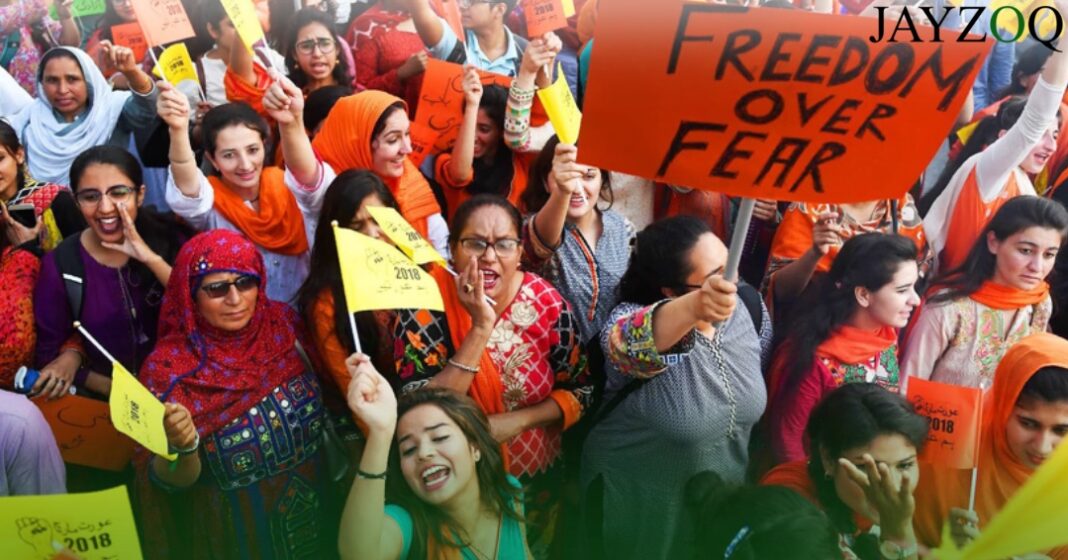Freedom of expression, in one form or another, is often touted to be the sole cause responsible for every misfortune that strikes Pakistan, be it a global pandemic or rising cases of sexual harassment. According to religious extremists on both an individual and an institutional level, freedom of expression is the heinous spawn of western democracy, poisoning the pak lands of our blessed nation and polluting our youth. From the creators of yahoodi sazish, we present to you, freedom of expression!
Nobody needs to look too far for examples of how the freedom of expression is not only restricted, but actively condemned in Pakistan. A plethora of current examples attest to this fact. For brevity, we will be focusing on restriction of freedom of expression by the society at large rather than state-sanctioned limitations. Most recently, a nationwide controversy emerged when a flight passenger reported an air hostess for giving a sheet to a couple kissing instead of forcing them to stop (Yes! A kiss in public is all it takes to make the headlines in Pakistan!). A hot debate about the permissibility of this public display of affection ensued which divided the country.
Similarly, a proposal in the University of Lahore led to such widespread criticism that the government itself was forced to take action against this atrocious act threatening the very foundation of the Islamic Republic of Pakistan. Despite rampant sexual harassment by teachers on campus and forced conversions of underage girls from religious minorities, the real force of evil in Pakistan is the youth openly expressing their love.
In a misogynistic, patriarchal country like Pakistan, it is not surprising to learn that a woman’s freedom of expression is disproportionately limited. The annual march for women’s rights, Aurat March, is maligned and disparaged. Those who take a stand for their rights through protesting are disparaged as fahash(obscene). Pakistan’s patriarchal roots run so deep as to warrant an attack on a woman’s very character if she tries to take any agency for change in her life. Whether a woman takes to the streets with slogans or tweets her support, she is maligned all the same. One particular instance that really strikes home the complete absence of freedom of expression in Pakistan is the sweeping outrage sparked by a popular slogan “mera jism, meri marzi” (my body, my choice). It was considered blasphemous by religious clerics that a woman have control over her own body. After all, if everybody were free to do as they wished, would the world not crumble to a million pieces?
Furthermore, Pakistan’s hypocrisy concerning freedom of expression became evident at a recent protest. A protest was held in Lahore for action against Israel’s bombardment in Palestine. Instead of reporting on the aims and demands of the protesters, one journalist took it upon herself to degrade females and their choice of clothing. Students were attacked for wearing t-shirts at a protest for Palestinian freedom.
It’s imperative to consider how we, as a society, got to the point that the word “freedom of speech” became so unanimously hated. For most far-right Pakistanis, freedom of speech has become a symbol of Islamophobia and the power of the west. Cartoons drawing and ridiculing the Holy Prophet (pbuh) has been published in Charlie Hebdo in the name of freedom of expression, despite the fact that they violate the law which prohibits hate speech. Incidents like these have colored the freedom of expression as a tool solely made and practiced for the humiliation of the religious sentiments of Muslims.
The lack of freedom of expression in Pakistan is driving a widening chasm between the left and right. It’s also restricting the possibility of bridging that gap as each side slowly becomes more and more extreme in its bubble. For there to be effective discourse, and Pakistan to grow as a nation, it’s important that we recognize the fact that freedom of expression is not some sort of western propaganda, but an essential right enshrined in the law (and religion too)







